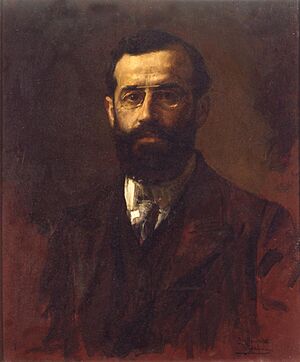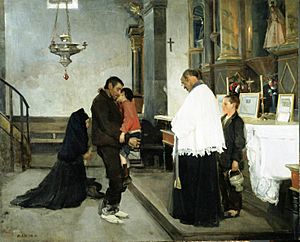Luis Menéndez Pidal facts for kids
Luis Menéndez Pidal was a talented Spanish painter. He was born on August 8, 1861, in Pajares, a town in Lena, Asturias. He passed away on February 7, 1932, in Madrid. Luis was best known for his genre paintings, which show scenes from everyday life.
Contents
About Luis Menéndez Pidal
Luis Menéndez Pidal came from a very interesting family. His father, Juan Menéndez Fernández, worked as a magistrate, which is like a judge. Luis also had two brothers, Juan and Ramón. They both became famous historians and writers.
Early Life and Education
Because of his father's job, Luis's family moved around a lot when he was a child. Even though he really wanted to be a painter, his father wanted him to study law. So, Luis went to the University of Oviedo and finished his law degree in 1884.
But while he was studying law, Luis also secretly took art classes! He attended the "Escuela de Bellas Artes de San Salvador." In 1885, he joined the "Escuela Superior de Pintura" in Madrid. This school was part of the famous Real Academia de Bellas Artes de San Fernando. There, he learned from a great teacher named Alejandro Ferrant.
Studying Art in Italy
Luis was very lucky to receive a special grant. This money allowed him to continue his art studies in Italy! He worked with well-known artists like José Villegas Cordero and Francisco Pradilla in Rome. After that, he spent some time in Florence at the Accademia Ussi. He learned a lot during his time abroad and returned to Spain in 1888.
Awards and Recognition
When Luis came back to Spain, his art started to get noticed.
- In 1890, he won a second-class medal at the National Exhibition of Fine Arts. He earned this for his painting called "A buen juez, mejor testigo," which means "A good judge is the best witness."
- Some of his paintings were even bought by the Regent, María Cristina, who was a very important royal figure.
In 1892, Luis got married and decided to live permanently in Madrid. He continued to win big awards for his art:
- In 1892, he won a first-class medal for his painting "La cuna vacía" (The empty cradle).
- In 1899, he won another first-class medal for "Salus infirmorum" (Salvation of the sick).
Teaching Career
Luis Menéndez Pidal also became a respected teacher.
- In 1900, he was named a Professor at the "Escuela Superior de Artes Industriales."
- The next year, he moved to the "Escuela de Artes y Oficios Artísticos." There, he was in charge of teaching decorative painting.
In 1907, Luis helped organize the room dedicated to the famous painter Diego Velázquez at the Museo del Prado. This is one of the most important art museums in the world! That same year, he became the Chair of Drawing at the San Fernando Academy. He held this important position until he retired at the age of seventy. Luis passed away a few months later.
His son, Luis Menéndez Pidal y Álvarez, also became famous. He was an architect who specialized in restoring old buildings.
See also
 In Spanish: Luis Menéndez Pidal para niños
In Spanish: Luis Menéndez Pidal para niños
 | William Lucy |
 | Charles Hayes |
 | Cleveland Robinson |



